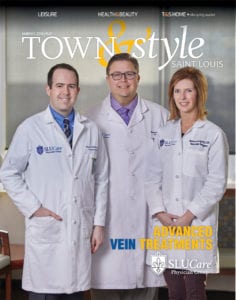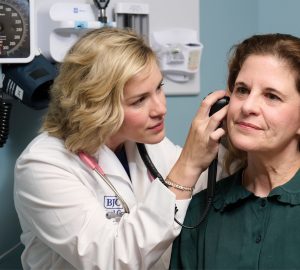Anyone who has had varicose veins can tell you that they’re not just unsightly, they also can cause serious pain and other health problems if not corrected. To provide relief for patients with this and other blood vessel conditions, SLUCare doctors are offering modern treatment options in a pleasant, comfortable new space in Richmond Heights.
Vascular surgeon Dr. Matthew Smeds says varicose and spider veins are some of the more common conditions SLUCare physicians treat on an outpatient basis at the recently refurbished University Tower office. “It’s a very comfortable space that is centrally located, so it’s convenient for patients from all over the area,” he notes. “Our physicians are board-certified in vascular surgery, and we have the resources and knowledge to provide a full range of services.” Smeds works with Dr. Michael Williams and advanced practice nurse Karen Gregory to assist patients at the office. They are planning a free screening for vein conditions April 10, and registration is available at slucare.edu/vein-screening. “Varicose veins happen when the greater saphenous vein in the leg becomes dilated because its valves aren’t working,” Smeds explains. “Blood pools in the wrong direction and causes soreness, a feeling of heaviness, fatigue and other symptoms. It also causes the vessel to bulge and twist.” Factory workers, retail employees, teachers and others who spend a lot of time standing on hard floors often get the condition.
 Smeds says varicose veins can be removed with laser or radiofrequency ablation, or a new treatment called VenaSeal that SLUCare soon will offer. VenaSeal uses an injected medical adhesive to close off and collapse the affected veins. “It has some definite advantages, such as fewer needle sticks, very little discomfort and no need for post-procedure compression stockings,” Smeds says. Bluish-purple spider veins are a cosmetic condition that SLUCare practitioners also can treat easily in the office. “Spider veins don’t cause any symptoms, but they’re unattractive,” Smeds notes. “They often show up on the legs or face. We inject them with an agent that causes them to shrink and disappear.” Like varicose veins, spider veins are most common in women and are likely hormone-related, Smeds says.
Smeds says varicose veins can be removed with laser or radiofrequency ablation, or a new treatment called VenaSeal that SLUCare soon will offer. VenaSeal uses an injected medical adhesive to close off and collapse the affected veins. “It has some definite advantages, such as fewer needle sticks, very little discomfort and no need for post-procedure compression stockings,” Smeds says. Bluish-purple spider veins are a cosmetic condition that SLUCare practitioners also can treat easily in the office. “Spider veins don’t cause any symptoms, but they’re unattractive,” Smeds notes. “They often show up on the legs or face. We inject them with an agent that causes them to shrink and disappear.” Like varicose veins, spider veins are most common in women and are likely hormone-related, Smeds says.
Madelyn Cardin of Jerome, Missouri, says varicose veins had been plaguing her for about three years when she went to see Dr. Williams. “My legs felt very stiff and heavy,” she explains. “It felt like I was walking around with a block of wood on each foot.” She was experiencing fatigue and other troubling symptoms as well, and Williams recommended endovenous laser ablation. Cardin had her right leg done first and scheduled the left leg for a later date.
“It wasn’t painful—it felt like small bee stings at most,” she says of the treatment, which is delivered via a catheter guided upward through the vein. “I was on my way home in less than an hour. I felt fine walking around and didn’t have any bruising or discomfort afterward. I was very pleased with the procedure and would recommend it to others. The SLUCare staff really made me feel like a priority.”
Pictured above: Dr. Michael Williams performs minimally invasive vein treatments.
Photo courtesy of SLUCare Physician Group
SLUCare Physician Group offers a full range of consultation and treatment services for vascular patients. Pictured on the cover: Dr. Michael Williams, Dr. Matthew Smeds and Karen Gregory, CNS. For more information, call 314.977.6051 or visit slucare.edu/vascular.
Cover design by Julie Streiler | Cover photo courtesy of SLUCare Physician Group








